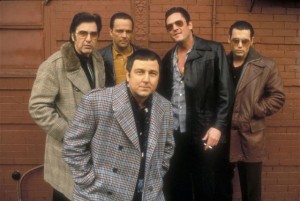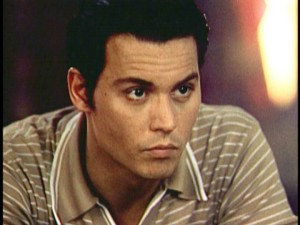“When they send for you, you go in alive, you come out dead, and it’s your best friend that does it.”
Any mention of great and underrated films always brings to my mind the superb ‘Donnie Brasco’. It’s been sitting there like an undiscovered classic since 1997 and I can’t understand why it’s not worshipped. It’s the type of film “What’s on TV” will give three stars to and that alone is enough to really set my teeth on edge.
I’ll admit there’s a few reasons why at first glance, it doesn’t fit the mould;
- Johnny Depp is now so beloved as the kiddie-franchise national-treasure (can you be a national treasure if the entire world is the nation in question?) that it’s a bit hard to take him seriously. My contrary nature means the more popular he becomes, the more I distain him.
- Anne Heche as Donnie’s wife? No actress should be more famous for banging Ellen DeGeneres than for her films. That’s no way to build a career, is it? I would never do that.
- Michael Madsen as The Don, Sonny Black. Now, we all like a bit of M&M, but is he really suited to ‘The Don’ role? To me, he always going to be better as the psychotic henchman, (even if Mr Blonde is 20 ago now) than the calm but terrifying overlord.
- It’s directed by Mike Newell, of ‘Four Weddings and a Funeral’ and ‘Harry Potter and the Goblet of Fire’ fame. Doesn’t necessarily bode well for a gritty crime film, does it?
But appearances can be deceptive and while nothing is ever likely to break ‘The Godfather’ and ‘Goodfellas’ twin strangle-hold on the genre, ‘Donnie Brasco’ in no way makes itself look like a freakin’ mook.
We have all seen TV shows and film where a cop goes undercover in the criminal gang, having to prove themselves and not give the game away. The in-built tension works a treat time and again and ‘The Departed’ for one, milks this brilliantly with its intertwining moles. Where ‘Donnie’ exceeds this, in my opinion, is a slower, more measured approach to how the living of a lie affects the deceiver. Instead of Leo DiCaprio’s hysteria and pill-popping and Matt Damon’s inability to get an erection, Johnny Depp as FBI agent Joe Pistone spend so much time in the company of criminals and wise guys that he finally accepts he is not living a lie anymore; he’s just living that life.
“All my life I’ve tried to be the good guy, the guy in the white fucking hat. And for what? For nothing. I’m not becoming like them; I am them.”
Johnny Depp may now be more famous for camp mugging and silly costumes, but this is him at his very best, playing it straight as the decent lawman increasing isolated from his family and co-workers, drawn into a world of moral equivalency. If an innocent Japanese waiter has to take a horrific beating to maintain Donnie’s cover, then that’s the way it’s got to be. Depp actually has to act in this film, rather than simply perform, and working with Pacino brings the best out of him, with Donnie ‘playing’ the slightly naive young man eager to learn the ways of mafia from Lefty (Pacino). His mild hero-worship plays on the older man’s sympathies and makes him let his guard down.
Pacino, or Al as I like to call him, is the ace the film has up its sleeve. If your gangster film has either Pacino or De Niro in it, everyone in the audience can heave a sigh of relief. Everything’s going to be alright, surely. But that’s not to suggest that Pacino is resting on his laurels here, far from it. This performance is very different from Michael Corleone, Tony Montana or Carlito Brigante and absolute worlds away from Vincent Hanna in ‘Heat’, made just before this film.
Pacino, so often the master of he surveys, loud, cocky and domineering, is here a beaten man. He’s old, getting older and not progressing in his ‘career’ the way he always dreamed, with younger men like Sonny Black climbing the ladder with ease. He has no millions squared away, it’s getting harder to earn the money that the bosses demand and he fears he may have cancer of the prick. So when he meets young up-and-comer Donnie, it’s only natural that he would want to take him under his wing. Through Donnie’s eyes, we learn about the workings of the mafia and this is where the film most closely resembles ‘Goodfellas’. It’s the details that make it such a pleasure, learning that wise guys never carry a wallet (only a money clip) and never pay for drinks, the distinctions between ‘friend of mine’ and ‘friend of ours’ and, most famously, the many permutations of ‘forget about it’.
“Forget about it is like if you agree with someone, you know, like Raquel Welch is one great piece of ass, forget about it. But then, if you disagree, like A Lincoln is better than a Cadillac? Forget about it! you know? But then, it’s also like if something’s the greatest thing in the world, like mingia those peppers, forget about it. But it’s also like saying go to hell too. Like, you know, like “Hey Paulie, you got a one inch pecker?” and Paulie says “Forget about it!” Sometimes it just means forget about it.”

What Donnie’s wife, Maggie, doesn’t understand and will never understand, is why this criminal seems to mean more to him than his wife and kids and it’s inevitable that the marriage will suffer. The nagging wife and defensive, emotionally shut-down husband is nothing we haven’t seen before, but it is done well here and the pointlessness of the couple suffering in order for the husband to try and bring down some fairly small-time criminals makes it all the more moving. This is not a great quest; even if Donnie ‘wins’, it’s hardly going to destroy the mafia. What it will do, however, is place a death sentence on Lefty for bringing Donnie into the inner sanctum and it’s that guilt which he can’t live with.
“If I come out alive, this guy, Lefty, ends up dead. That’s the same thing as me putting the bullet in his head myself.”
It’s this relationship, between Lefty and Donnie, half hunter and prey, half mentor and protégé that makes the film stand out from the rest. They both risk their lives for each other in different ways and end up seeming more honourable than either of the organisations they represent, both of which apparently proclaim the importance of loyalty. ‘Trust’ is relative and even though Donnie spends the entirety of their time together lying to Lefty, he’s still the best friend he has.
It’s a great film, it stands up to re-watching and it has a timeless feel to it. The ‘good guy going undercover with the bad guys’ story can work in Roman times, World War II, a space station in the year 3030 or pretty much anywhere else you’d care to name. ‘Donnie Brasco’ just does it best. Forget about it.



